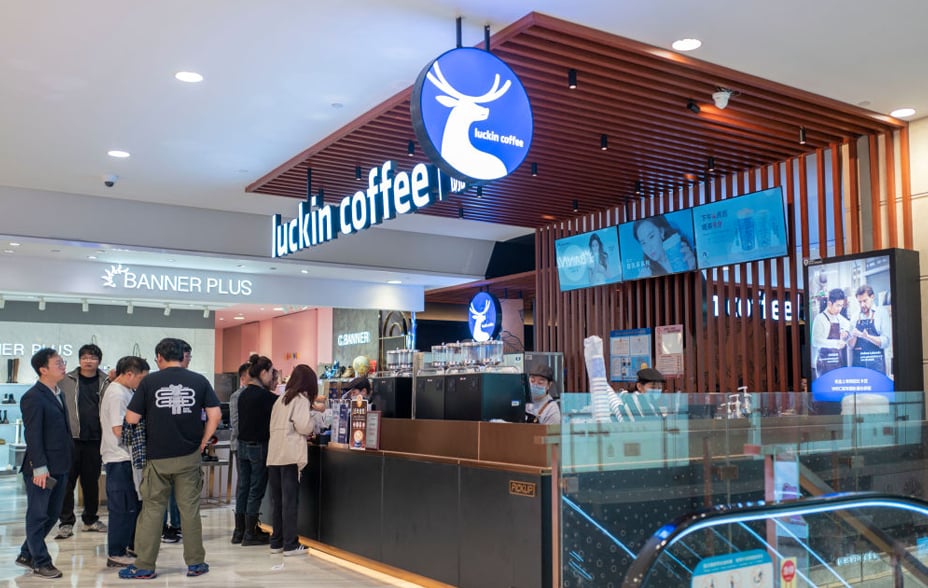Key points
- To get access to the best private companies, it’s vital to build relationships with their founders and senior management
- Baillie Gifford’s reputation and selective investment approach help us identify companies with the potential to deliver long-term growth
- SpaceX, Bending Spoons and Epic Games are private companies whose ambition and first-principles thinking helped find them a place in our portfolios
WATCH: Investment manager Alexander Nicolier (right) discusses the importance of building relationships with private company founders in his Disruption Week briefing
Your capital is at risk.
“When you see the gringo, bring him in.”
That’s what one founder told the waiter in a bustling restaurant in Bogotá as he waited for a potential investor from over 5,000 miles away.
No gringo arrived, but investment manager Alexander Nicolier from Baillie Gifford did.
“You could see the shock on his face when he discovered he was speaking with a fellow Colombian,” Nicolier recalls in his recent Disruption Week webinar.
“It meant he could be open and tell his company’s story naturally in his native Spanish. The same applied in my other meetings there, and it was a definite advantage.”
The encounter occurred during a recent investment trip to meet various Latin American private firms. Nicolier met approximately 30 companies over the course of his trip. Approximately half of the meetings were arranged directly, with Baillie Gifford’s reputation as a patient public investor helping open doors.
The rest came about via introductions made by one of the founders of Loft, a privately-owned Brazilian digital real estate platform that Baillie Gifford has backed.
“The advantage was we knew we were knocking on the right doors and not just aimlessly walking into unknown territory,” Nicolier says.
Reputation counts
Our firm’s track record is critical to our private market access as founders pick their investors rather than vice versa, as in public markets.
“You can’t just look up the financials of private companies and pinpoint those you are most interested in,” explains Nicolier.
“Your fishing net depends on the relationships and trust that you’ve built with other founders who can open the door to what could be great investments down the line.”
That’s especially important when gaining access to companies with a proven business model but still relatively young, letting our clients share in what can be the fastest growth stages.
Staying private for longer
Today, more than 1,500 private companies are valued at more than $1bn. These so-called unicorns have a collective worth of about $5tn.
“The reality is that private companies are real growth businesses, some of which have been operating for some time,” says Nicolier. “One of our current private investments, Epic Games, the maker of Fortnite, is 34 years old.”

Creators can use Epic Games’ Unreal Engine to build 3D environments for video games and other experiences
© Epic Games
With growth split between private and public markets, Nicolier says, “this change represents an opportunity. Our skill set as investors is highly relevant and applicable to this space.”
Since Baillie Gifford’s first private company investment in Alibaba in 2012, we have deployed more than $9bn in over 140 private companies. In doing so, we have been highly selective.
Nicolier reveals that while Baillie Gifford’s Private Companies Team meets up to 800 companies in any given year, it only invests in about 10 to 12.
“We are on the hunt for companies demonstrating scaling benefits and strong execution, and while some may still be on the path to profitability, others will already be there.”
That pursuit involves working closely with investment teams across our business to help spot opportunities. For example, before taking a stake in the Chinese firm ByteDance – famous for its video-sharing apps TikTok and Douyin – the team drew on our firm’s research into Tencent and Facebook’s owner Meta to help form its view.
SpaceX’s ambition
SpaceX is another example of a private company investment that gives Baillie Gifford’s clients access to one of the world’s most exciting companies.
The firm recently captured the world’s imagination by catching a giant rocket booster with metal arms, bringing forward the day it achieves rapid turnarounds between its landings and launches. In addition, it announced that its Starlink satellite broadband service has surpassed four million subscribers.

The rocket booster SpaceX caught in October was the height of a 20-story building
© Anadolu/Getty Images
While we couldn’t have known it would achieve either milestone on this timeline when we first invested six years ago, the company’s ambition and expertise signalled it was capable of outperformance.
“Even in 2018, we knew it had a working system for the Falcon 9 rockets that could come back and land autonomously,” says Nicolier. “That is something that no government agency would have ever dreamed of achieving, and they still can’t.”
Acquiring apps
Sometimes, a private company’s appeal is less out-of-this-world and more down-to-earth. That was the case with Bending Spoons, an Italian technology firm that builds and acquires mobile apps.
It targets companies that it can buy for a fraction of the total capital that would be needed to get them to their current stage of development. Then, it strips out bloated operating expenses and provides subscribers with a better experience, charging higher fees in turn.
Its portfolio includes the note-taking platform Evernote, the file-sharing service WeTransfer and the AI-powered photo editing tool Remini.
By rethinking everything from the ground up, Nicolier says the company turns “good products into profitable ones, but also ones that can grow and reach their ultimate potential”.
Off the radar of many Silicon Valley investors, Bending Spoons approached the Private Companies Team on the recommendation of an investment bank that had worked with Baillie Gifford on other deals.
“It referred management to us as a patient partner that would sustain its journey beyond its flotation,” says Nicolier.
That fit is crucial. Nicolier notes that about 80 per cent of Silicon Valley’s private companies lose their independent status by being taken over by larger firms.
“We are looking for those 20 per cent that become standalone businesses that can go from private to the public market and do that seamlessly,” he adds. “And, if they are executing on their business plan, we will support them throughout this entire journey. That is something founders find appealing about our approach”.
On the right path
At the same time, we don’t pressure companies to become public before they are ready. In exceptional cases, such as Epic Games, we recognise they may want to stay private indefinitely.
“As long as we believe our clients will be able to make at least five times their money in these investments and that we’re able to exit our position on their behalf via secondary markets or otherwise, it doesn’t matter whether they choose to stay private,” says Nicolier.
“And the best companies will always find a path to being public if they wish.”
To illustrate his point, Nicolier highlights two recently floated Private Companies Team holdings. Oddity, which uses technology to improve skin care, celebrated its initial public offering (IPO) in July 2023, and Tempus AI, which helps healthcare professionals diagnose and treat cancer, did so in June 2024. Both still have a place in Baillie Gifford’s portfolios.
Finding Alignment
By finding alignment between ourselves, company founders, our clients and other investors, we can supercharge these firms’ growth potential and accelerate the release of innovations that benefit society.
“This segment of the private markets didn’t really exist a decade ago. Now it is impossible to ignore.”
Identifying enduring, scalable growth potential is something Baillie Gifford’s investment managers have always done.
"We believe that because these are great growth companies, our clients should also benefit from the value they’re creating," says Nicolier.
Risk Factors
The views expressed should not be considered as advice or a recommendation to buy, sell or hold a particular investment. They reflect opinion and should not be taken as statements of fact nor should any reliance be placed on them when making investment decisions.
This communication was produced and approved in November 2024 and has not been updated subsequently. It represents views held at the time of writing and may not reflect current thinking.
This communication contains information on investments which does not constitute independent research. Accordingly, it is not subject to the protections afforded to independent research, but is classified as advertising under Art 68 of the Financial Services Act (‘FinSA’) and Baillie Gifford and its staff may have dealt in the investments concerned.
All information is sourced from Baillie Gifford & Co and is current unless otherwise stated.
The images used in this communication are for illustrative purposes only.
Words by Gillian Christie
124231 10051127



